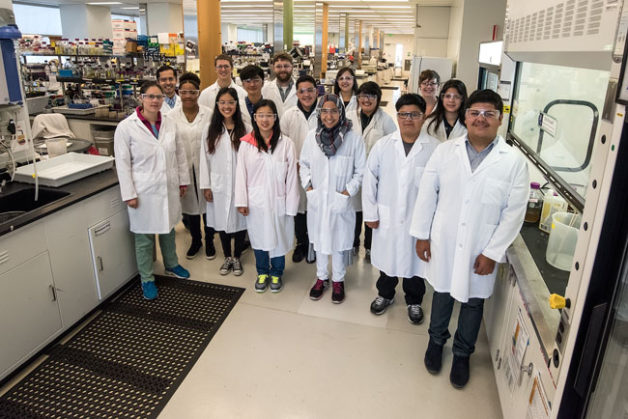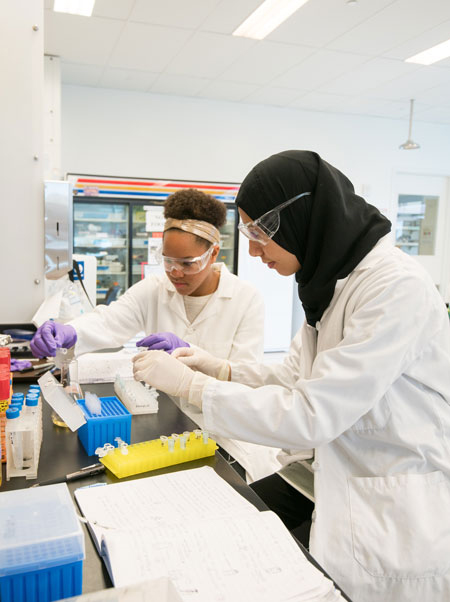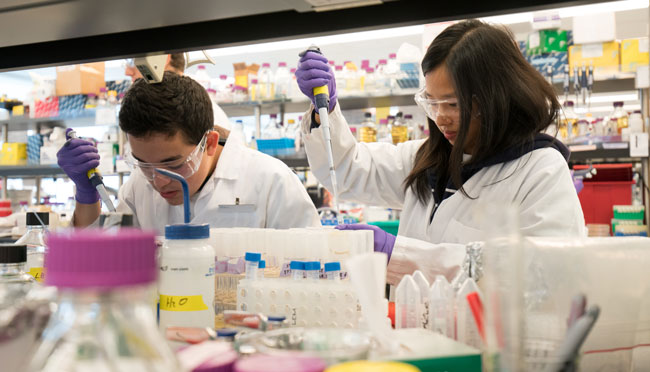For Constance Bailey, a postdoctoral researcher at the Joint BioEnergy Institute (JBEI), participating as a science adviser in an intensive summer research and education program is her way of ensuring that budding scientists maintain their interest in the field. She helps provide hands-on lab experience for participants of the Introductory College Level Experience in Microbiology (iCLEM), an intense, eight-week summer research program that targets low-income high school students in the Bay Area who have demonstrated a strong interest in science.
An intensive summer program helps high school students explore the field of science. (Credit: Berkeley Lab)
Now an expert in fuels synthesis, Bailey recalls how she almost gave up on science when she was a teenager struggling in chemistry class.
“I wasn’t sure I would study science in college at all,” said Bailey, who went on to get her Ph.D. in chemistry at the University of Texas. “I participated in a high school science outreach program when I was their age, and it changed everything for me. In class, you’re doing experiments to find the right answer to an assignment, but in real labs, you’re trying to find something new. Being a researcher is different than being a student. It’s a different skill set; it’s more creative and open-ended. The earlier kids get exposure to that, the better.”
The iCLEM program was co-developed in 2007 by JBEI and Synberc, a multi-university research center funded by the National Science Foundation. It is now run by JBEI, a Department of Energy Bioenergy Research Center managed by the Lawrence Berkeley National Laboratory (Berkeley Lab).

Students, teachers and teacher assistants at this summer’s iCLEM program. (Credit: Paul Mueller/Berkeley Lab)
This year, eight high school students who have completed their junior or sophomore years were chosen from a competitive pool of applicants. They collaborate with high school science teachers and JBEI scientists, gaining experience in synthetic biology, microbiology, molecular biology, and biochemistry research. Upon completion of the eight-week program, they will earn $2,000.
In addition to real-life experience in the lab, participants are exposed to different science and engineering careers through presentations by science professionals and by field trips to Bay Area biotech companies and research institutions. The iCLEM program also provides help with college applications, including advice and feedback on personal statements.
“That’s what sets iCLEM apart,” said iCLEM student Alejandro Gonzalez, a rising senior at Berkeley High School.
Some 98 percent of iCLEM graduates go on to attend college, with more than 80 percent of those students majoring in STEM (science, technology, engineering and mathematics) fields. Gonzalez expects to be the first person in his family to attend a four-year college, and the only one pursuing a career in science.
“This experience has reinforced my wanting to be in this career,” said Gonzalez. “I think iCLEM is great in that you get a lot of exposure to research in a lab, and you work together as part of a team rather than being alone with just one adviser. I definitely feel like I could do this.”

Students Midori Thrower and Marwat Al-Olefi gain hands-on lab experience through the summer iCLEM program. (Credit: Danny Tang/JBEI)
Cynthia Martinez, a UC Berkeley senior majoring in environmental sciences and a teaching assistant at iCLEM, emphasizes the importance of the program’s support for students who want to continue the path toward a career in research.
“What’s really important about iCLEM is that it’s not just a science program,” said Martinez, the first person in her family to go to college. “At the outset, iCLEM wants to make sure these students can succeed and inspire others. We want to inspire a more diverse set of scientists in the future because of the growing minority populations in this country. We need people of these groups represented in science fields so we can get different solutions and ideas to be reflective of this diversity in our country’s population.”
That sentiment was echoed by iCLEM student Marwat Al-Olefi, an upcoming senior at Life Academy in Oakland.
“Having cultural diversity in the research field provides a different perspective,” said Al-Olefi, who was born in Yemen. She cites as an example a high school exercise in which students had to prioritize limited public health resources in the battle to reduce HIV/AIDS infections.
“Most of my classmates wanted to put the money toward medical research, but I chose education first,” she said. “I knew that in my culture, you can’t just go up to a person and say, ‘Hey, take this pill because you’re HIV positive.’ A lot of people don’t realize how big of a deal it is, and that it’s not in our culture to openly talk about our medical history.”
On Wednesday, Aug. 10, students will cap off this year’s iCLEM season with a presentation about microbes they collected in their communities. The students tested whether the enzymes produced by the microbes could break down plant matter to produce sugars for biofuels production.
Other students in the 2016 iCLEM class are Estefany Gutierrez, a junior at Richmond High School; Darren Jian, a senior at San Leandro High School; Alejandro Prieto, a senior at Lighthouse Community Charter High School; Carlos Rodriguez, a junior at Irvington High School; Samantha Tang, a senior at Lowell High School; and Midori Thrower, a senior at Berkeley High School.
Additional funding for the program was provided by pharmaceutical companies Amgen and Bayer.
###
Lawrence Berkeley National Laboratory (Berkeley Lab) addresses the world’s most urgent scientific challenges by advancing sustainable energy, protecting human health, creating new materials, and revealing the origin and fate of the universe. Founded in 1931, Berkeley Lab’s scientific expertise has been recognized with 13 Nobel prizes. The University of California manages Berkeley Lab for the U.S. Department of Energy’s Office of Science. For more, visit www.lbl.gov.
